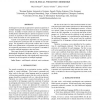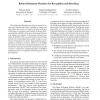367 search results - page 35 / 74 » Large-Vocabulary Speech Recognition Algorithms |
79
Voted
ICASSP
2008
IEEE
15 years 5 months ago
2008
IEEE
In this paper we present an approach for speech recognition of multiple languages with constrained resources on embedded devices. Examples of such systems are navigation systems, ...
93
Voted
CSL
2010
Springer
14 years 11 months ago
2010
Springer
We propose a unified global entropy reduction maximization (GERM) framework for active learning and semi-supervised learning for speech recognition. Active learning aims to select...
NAACL
1994
15 years 11 days ago
1994
This paper describes several new cepstral-based compensation procedures that render the SPHINX-II system more robust with respect to acoustical environment. The first algorithm, p...
109
click to vote
CVPR
2012
IEEE
13 years 1 months ago
2012
IEEE
While Boltzmann Machines have been successful at unsupervised learning and density modeling of images and speech data, they can be very sensitive to noise in the data. In this pap...
ISCAS
2003
IEEE
15 years 4 months ago
2003
IEEE
The most popular speech feature extractor used in automatic speech recognition (ASR) systems today is the mel frequency cepstral coefficient (mfcc) algorithm. Introduced in 1980,...


